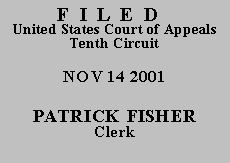

|
UNITED STATES OF AMERICA,
v.
ROBERT LEE DOWNS |
|
Before HENRY, BRISCOE, and MURPHY, Circuit Judges.
Defendant-Appellant Robert Lee Downs pleaded guilty to a charge of possession with intent to distribute marijuana. The marijuana was discovered in the trunk of Downs' vehicle during a roadside search conducted by a Kansas Highway Patrol officer. The indictment against Downs was handed down by a federal grand jury and Downs was sentenced by the United States District Court for the District of Kansas.
In a motion filed on August 17, 2000, Downs sought the return of cash, jewelry, and other personal effects allegedly seized when he was arrested. The district court granted the motion in part, ordering the United States to return the currency and to engage in a good-faith effort to locate Downs' other personal property. On February 9, 2001, the United States filed a status report with the district court detailing its efforts at locating the property. The United States reported that it had contacted members of the Kansas Highway Patrol and the Sherman County Sheriff's Department but had been unable to locate Downs' property or even confirm that any property other than clothing had been received.
Downs then filed a motion requesting compensation for the personal property. The court construed Downs' motion as one filed pursuant to Rule 41(e) of the Federal Rules of Criminal Procedure. The court noted that Downs' property was seized by Kansas state officials, it was not introduced as evidence during the federal criminal proceeding against Downs, and the United States did not have actual possession of the property. The court concluded that Downs failed to establish that the United States had "extensive federal possession or control" over Downs' property. Clymore v. United States, 164 F.3d 569, 571 (10th Cir. 1999). The court denied the motion and vacated the portion of its earlier ruling requiring the United States to return the cash to Downs. The court also denied Downs' subsequent motion for reconsideration, reiterating its conclusion that the United States did not have actual or constructive possession of Downs' property.
When property is seized by state officials, a movant can invoke Rule 41(e) if: (1) federal authorities have actual possession of the property, (2) federal authorities have constructive possession of the property that "was considered evidence in the federal prosecution," or (3) the state officials acted at the direction of federal authorities when the property was seized. Id. Downs does not contend that the United States has actual possession of his property. Additionally, Downs has not demonstrated that the personal property at issue is constructively possessed by the United States because it "was considered evidence in the federal prosecution." Id. The items identified by Downs are personal effects and cash and were not relevant to the prosecution of the charge contained in the indictment. A movant must show more than the mere fact that the charges against him were ultimately prosecuted in federal court to establish that the United States is in constructive possession of his personal property.
Downs also argues that Kansas state officials were acting at the direction of the United States when the items were seized because the State of Kansas has entered into an agreement with the United States pursuant to which it defers prosecution of all drug pipeline cases involving a sufficiently large quantity of drugs to the United States. Downs has not offered a scintilla of evidence to support his bald allegation that the United States and the State of Kansas have entered into a tacit agreement governing the prosecution of drug pipeline cases. Thus, he cannot rely on the theory that the State of Kansas was acting as the agent of the United States when it seized the property.
Because Downs has failed to show that the United States has actual or constructive possession of his property, there is no federal jurisdiction over Downs' motion. Id. at 571-72. Although the district court concluded that it lacked jurisdiction over Downs' motion, it nonetheless denied the motion. Because we likewise conclude there is no federal jurisdiction over Downs' motion, we remand with instructions to the district court to vacate its order denying Downs' motion and to enter an order dismissing the motion. The mandate shall issue forthwith.
ENTERED FOR THE COURT
Michael R. Murphy
Circuit Judge
*. This order and judgment is not binding precedent, except under the doctrines of law of the case, res judicata and collateral estoppel. The court generally disfavors the citation of orders and judgments; nevertheless, an order and judgment may be cited under the terms and conditions of 10th Cir. R. 36.3.